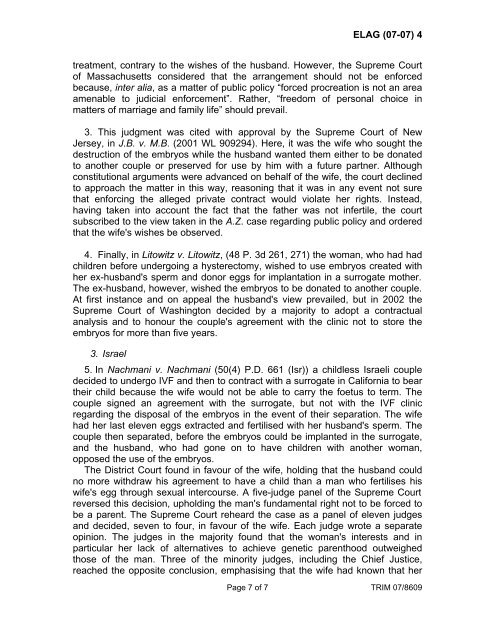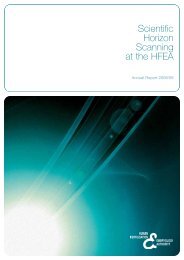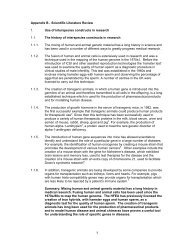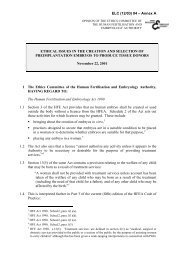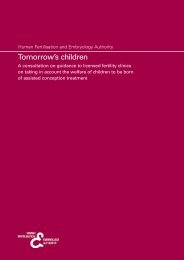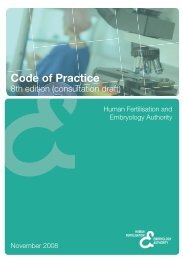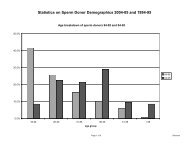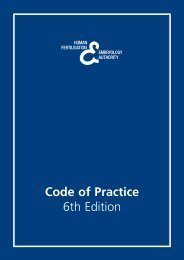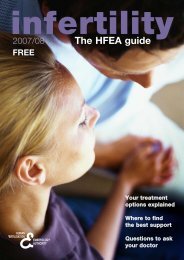Bilateral consent to use sperm/embryos for reproductive purposes
Bilateral consent to use sperm/embryos for reproductive purposes
Bilateral consent to use sperm/embryos for reproductive purposes
Create successful ePaper yourself
Turn your PDF publications into a flip-book with our unique Google optimized e-Paper software.
ELAG (07-07) 4treatment, contrary <strong>to</strong> the wishes of the husband. However, the Supreme Cour<strong>to</strong>f Massach<strong>use</strong>tts considered that the arrangement should not be en<strong>for</strong>cedbeca<strong>use</strong>, inter alia, as a matter of public policy “<strong>for</strong>ced procreation is not an areaamenable <strong>to</strong> judicial en<strong>for</strong>cement”. Rather, “freedom of personal choice inmatters of marriage and family life” should prevail.3. This judgment was cited with approval by the Supreme Court of NewJersey, in J.B. v. M.B. (2001 WL 909294). Here, it was the wife who sought thedestruction of the <strong>embryos</strong> while the husband wanted them either <strong>to</strong> be donated<strong>to</strong> another couple or preserved <strong>for</strong> <strong>use</strong> by him with a future partner. Althoughconstitutional arguments were advanced on behalf of the wife, the court declined<strong>to</strong> approach the matter in this way, reasoning that it was in any event not surethat en<strong>for</strong>cing the alleged private contract would violate her rights. Instead,having taken in<strong>to</strong> account the fact that the father was not infertile, the courtsubscribed <strong>to</strong> the view taken in the A.Z. case regarding public policy and orderedthat the wife's wishes be observed.4. Finally, in Li<strong>to</strong>witz v. Li<strong>to</strong>witz, (48 P. 3d 261, 271) the woman, who had hadchildren be<strong>for</strong>e undergoing a hysterec<strong>to</strong>my, wished <strong>to</strong> <strong>use</strong> <strong>embryos</strong> created withher ex-husband's <strong>sperm</strong> and donor eggs <strong>for</strong> implantation in a surrogate mother.The ex-husband, however, wished the <strong>embryos</strong> <strong>to</strong> be donated <strong>to</strong> another couple.At first instance and on appeal the husband's view prevailed, but in 2002 theSupreme Court of Washing<strong>to</strong>n decided by a majority <strong>to</strong> adopt a contractualanalysis and <strong>to</strong> honour the couple's agreement with the clinic not <strong>to</strong> s<strong>to</strong>re the<strong>embryos</strong> <strong>for</strong> more than five years.3. Israel5. In Nachmani v. Nachmani (50(4) P.D. 661 (Isr)) a childless Israeli coupledecided <strong>to</strong> undergo IVF and then <strong>to</strong> contract with a surrogate in Cali<strong>for</strong>nia <strong>to</strong> beartheir child beca<strong>use</strong> the wife would not be able <strong>to</strong> carry the foetus <strong>to</strong> term. Thecouple signed an agreement with the surrogate, but not with the IVF clinicregarding the disposal of the <strong>embryos</strong> in the event of their separation. The wifehad her last eleven eggs extracted and fertilised with her husband's <strong>sperm</strong>. Thecouple then separated, be<strong>for</strong>e the <strong>embryos</strong> could be implanted in the surrogate,and the husband, who had gone on <strong>to</strong> have children with another woman,opposed the <strong>use</strong> of the <strong>embryos</strong>.The District Court found in favour of the wife, holding that the husband couldno more withdraw his agreement <strong>to</strong> have a child than a man who fertilises hiswife's egg through sexual intercourse. A five-judge panel of the Supreme Courtreversed this decision, upholding the man's fundamental right not <strong>to</strong> be <strong>for</strong>ced <strong>to</strong>be a parent. The Supreme Court reheard the case as a panel of eleven judgesand decided, seven <strong>to</strong> four, in favour of the wife. Each judge wrote a separateopinion. The judges in the majority found that the woman's interests and inparticular her lack of alternatives <strong>to</strong> achieve genetic parenthood outweighedthose of the man. Three of the minority judges, including the Chief Justice,reached the opposite conclusion, emphasising that the wife had known that herPage 7 of 7 TRIM 07/8609


